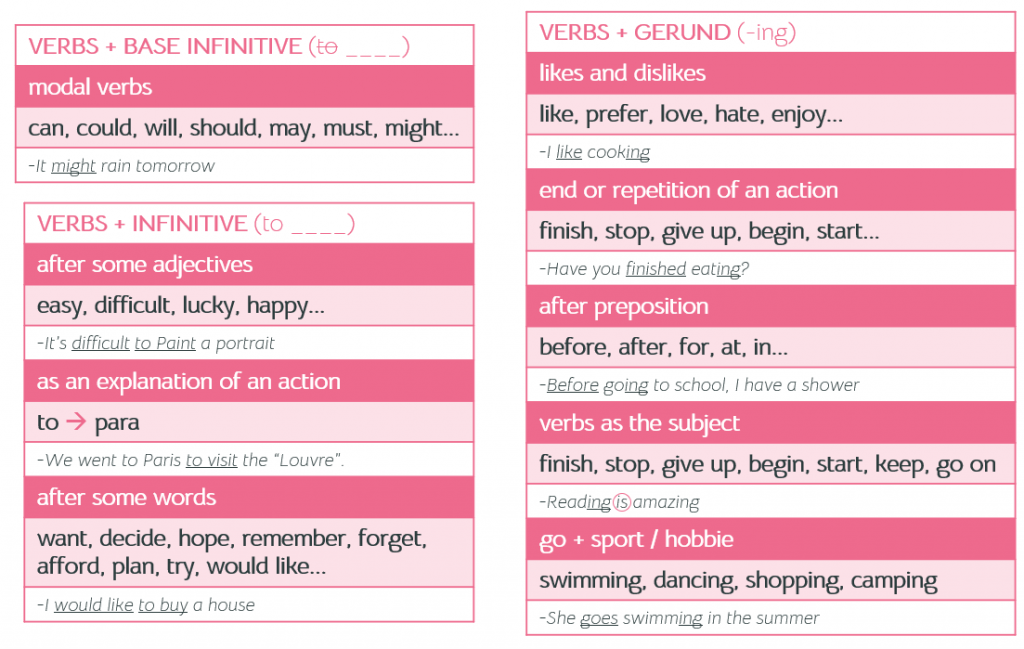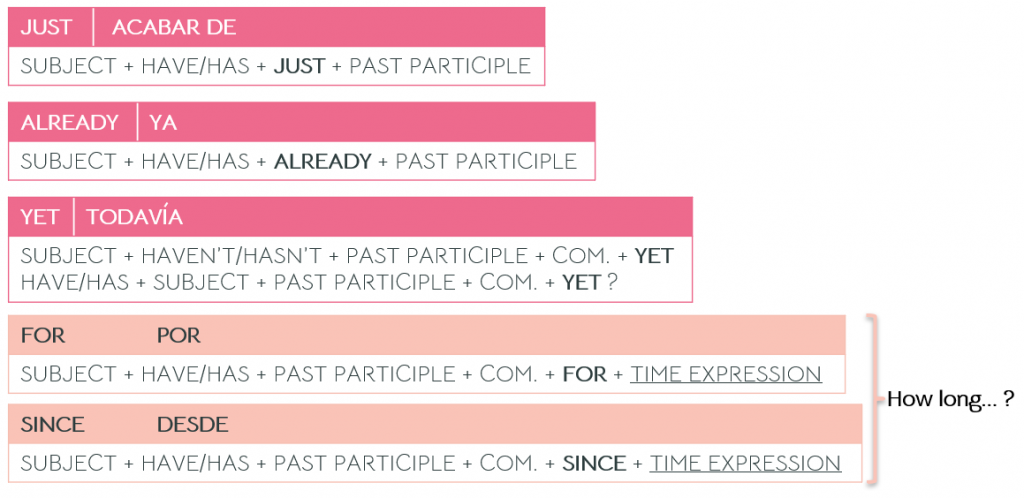El contenido de esta entrada ha sido extraído de los siguientes archivos que he creado con la información que se ha explicado en clase:
VOCABULARY
Describing places
- ancient: antiguo/a
- crowded: lleno de gente
- polluted: contaminado/a
- dirty: sucio/a
- expensive: caro/a
- exciting: emocionante
- comfortable: cómodo/a
- lively: alegre, vivo/a
- pretty: bonito/a
- peaceful: pacífico/a
- romantic: romántico/a
- safe: seguro/a
- dangerous: peligroso/a
- ugly: feo/a
Collocations
- swim + in the sea = nadar en el mar
- lie + on the beach = tumbarse en la playa
- get a suntan / get sunburnt = broncearse / quemarse
- wear + suncream = llevar crema solar
- go + abroad / go + sport -ing = ir al extranjero / practicar un deporte acabado en -ing
- take + a photo = tomar una foto
- visit + a museum = visitar un museo
- hire + a bike = alquilar una bicicleta
- have + a barbecue = hacer una barbacoa
Travelling words
- journey (noun): one occasion when you travel to once place to another (se refiere al trayecto)
- trip (noun): the process of going somewhere and returning (más referido al viaje y la estancia en su conjunto)
- voyage (noun): a long journey by boat or into space (un viaje cuyo trayecto es duradero, generalmente por mar o el espacio)
- travel (verb): go from one place to another, usually in a vehicle (significa viajar)
Skills and abilities
- bake cupcakes: cocinar pasteles
- learn a foreign language: aprender una lengua extranjera
- learn first aid: aprender primeros auxilios
- learn to juggle: aprender a hacer malabares
- do magic tricks: hacer trucos de magia
- perform on stage: actuar en un escenario
- play in a band: tocar en una banda musical
- speak in public: hablar en público
- ride a unicycle: montar en uniciclo
- make a video blog: hacer un vídeo blog
- write a song: escribir una canción
- write computer code: escribir código
- design a website: diseñar una página web
- edit photos: editar fotos
Life skills
- self-awareness: entender nuestros propios sentimientos y capacidades
- assertiveness: expresar adecuadamente los sentimientos o pensamientos
- active listening: capacidad de escuchar atentamente
- creative thinking: capacidad de tener creatividad
- conflict resolution: capacidad de resolver un conflicto
- problem-solving: el proceso de encontrar soluciones a problemas
- time management: capacidad de gestionar el tiempo
- money management: capacidad de gestionar el dinero
- cooperation: trabajo grupal
- respect for others: tratar a la gente con respeto y tolerancia
- negotiation: intentar conseguir un acuerdo
- entrepreneurship: ser innovador o comenzar un nuevo negocio
GRAMMAR
Comparatives & superlatives
Clasificamos los adjetivos en tres grupos para formar sus modelos de comparativos y superlativos:
- SHORT ADJECTIVES:
- 1 syllable
- COMPARATIVE: ______er than (ex: safer than)
- SUPERLATIVE: the ______est (ex: the safest)
- 1 syllable ending in consonant/vowel/consonant
- COMPARATIVE: ______(doble consonant)er than (ex: sadder than)
- SUPERLATIVE: the _______(doble consonant)est (ex: the saddest)
- 2 syllables ending in
-y- COMPARATIVE: ______(i)er than (ex: happier than)
- SUPERLATIVE: the ______(i)est (ex: the happiest)
- 1 syllable
- LONG ADJECTIVES:
- 2 syllables without ending in -y and 2 or more syllables:
- COMPARATIVE: more __________ than (ex: more common than)
- SUPERLATIVE: the most __________ (ex: the most common)
- 2 syllables without ending in -y and 2 or more syllables:
- IRREGULAR ADJECTIVES: don’t follow the rules!
- These are some examples:
- BAD
- COMPARATIVE: worse than
- SUPERLATIVE: the worst
- GOOD
- COMPARATIVE: better than
- SUPERLATIVE: the best
- FAR
- COMPARATIVE: further than
- SUPERLATIVE: the furthest
- BAD
- These are some examples:

Verbs combination
Al combinar dos verbos en una misma oración, el secundario (no es el main verb) puede expresarse en un tiempo u otro dependiendo de lo que acompañe:
- VERBS + BASE INFINITIVE (solo el verbo, sin el
to):- modals verbs: can, could, should, will, might, may, must…
EX: It might rain tomorrow.
- modals verbs: can, could, should, will, might, may, must…
- VERBS + INFINITIVE (to + verb):
- after some adjectives: easy, difficult, lucky, happy…
EX: It’s difficult to Paint a portrait. - after some words: want, decide, hope, remember, forget, afford, plan, try, would like…
EX: I would like to buy a house. - to –> para
EX: We went to Paris to visit the «Louvre» (para visitar)
- after some adjectives: easy, difficult, lucky, happy…
- VERBS + GERUND (verb -ing):
- likes and dislikes: like, prefer, love, hate, enjoy…
EX: I like cooking. - end or repetition of an action: finish, stop, give up, begin, start…
EX: Have you finished eating? - go + sport / hobbie (si terminan en ing): swimming, dancing, shopping, camping
EX: She goes swimming in the summer. - after preposition: before, after, for, at, in…
EX: Before going to school, I have a shower. - verbs as the subject:
EX: Reading is amazing
- likes and dislikes: like, prefer, love, hate, enjoy…

Present simple

Present continuous

Past simple


Past continuous


Present perfect

PRESENT PERFECT TIME EXPRESSIONS

Espero que te haya gustado. Más entradas como esta en eva-arnau.es ;).
